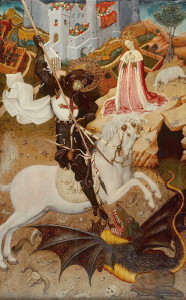"It is the eve of St. George's Day. Do you not know that tonight, when the clock strikes midnight, all the evil things in the world will have full sway?" -Bram Stoker's Dracula
 As the weather becomes warmer and the trees and flowers start to bloom I inevitably think of the feast of St. George which according to a popular Romanian legend is the day when the saint opens the door to summer. St. Andrew’s Day, of which I have blogged previously, is the day in which St. Andrew opens the door to winter. Curiously the eve before both of these holy days is associated in many Eastern European countries with witchcraft and heightened supernatural activity. According to the Gregorian calendar, the feast of St. George falls on the 23rd of April and according to the Julian calendar still used by many Eastern Orthodox Churches the saint’s day falls on 5th of May. In his famous novel Dracula, Bram Stoker makes mention of St. George’s Eve in the following passage:
As the weather becomes warmer and the trees and flowers start to bloom I inevitably think of the feast of St. George which according to a popular Romanian legend is the day when the saint opens the door to summer. St. Andrew’s Day, of which I have blogged previously, is the day in which St. Andrew opens the door to winter. Curiously the eve before both of these holy days is associated in many Eastern European countries with witchcraft and heightened supernatural activity. According to the Gregorian calendar, the feast of St. George falls on the 23rd of April and according to the Julian calendar still used by many Eastern Orthodox Churches the saint’s day falls on 5th of May. In his famous novel Dracula, Bram Stoker makes mention of St. George’s Eve in the following passage:
“Do you know what day it is?” I answered that it was the fourth of May. She shook her head as she said again: “Oh, yes! I know that, I know that! but do you know what day it is?” On my saying that I did not understand, she went on: “It is the eve of St. George’s Day. Do you not know that tonight, when the clock strikes midnight, all the evil things in the world will have full sway?”
In contrast to St. Andrew’s Eve which is seen as a night to practice divination and to employ all sorts of charms against evil forces, St. George’s Day is also known as a particularly lucky day to perform love magic. This is true throughout many countries where the saint is venerated. This is perhaps due to the warm spring weather that inspires such feelings of love and also to a medieval legends regarding St. George that portrays him as a romantic hero.
It is said about St. George that little is known of him but much is owed to him. According to an early Roman martyrology, St. George was born in what is today Syria to Christian parents, yet he served in the Roman army under the pagan Emperor Diocletian. When it was discovered that St. George was a Christian, the Emperor tried to convince him to convert to paganism by offering him many lavish and expensive gifts. Diocletian had taken a strong liking to George and wanted him to remain in his service, but George remain steadfast in his faith and refused to worship the pagan Roman gods and thereby suffered martyrdom under the Diocletian who reluctantly put him to death. Another one of my favorite saints, St. Barbara also suffered martyrdom under the Emperor Diocletian as did many other fervent Christians. The date of St. George’s martyrdom is recorded as 23 April which remains his feast day today.
According to a popular medieval legend, in the region of Cappadocia there was a princess who was held captive by an angry dragon in a tower. St. George slew the Dragon thereby freeing the Princess and taking on the role of romantic hero. Due to this legend, in eastern Spain, especially in the region of Catalonia, St. George’s Day is celebrated much like Valentine’s Day in other parts of the world where flowers are exchanged among lovers and friends. There also exists the tradition of sharing books on St. George’s Day, although this tradition is not nearly as ancient as the giving of flowers dating only to the early 20th century as a tradition commemorating the deaths of two literary giants Miguel de Cervantes and William Shakespeare who coincidentally died on the evening and the day of the feast of St. George respectively in 1616.
There is no obvious explanation as to the correlation between St. George and heightened supernatural activity that exists in Eastern European folklore. I can only hypothesize that this association comes from the legend regarding St. George slaying the Dragon which in a way enshrines him as a warrior and protector against evil and dangerous forces. Whatever the case, it is never a bad thing to pray to a saint and seek his or her love and protection. May St. George protect watch over and guide us!
I thank you for taking the time to check out my blog and I wish you happiness and abundant blessings!